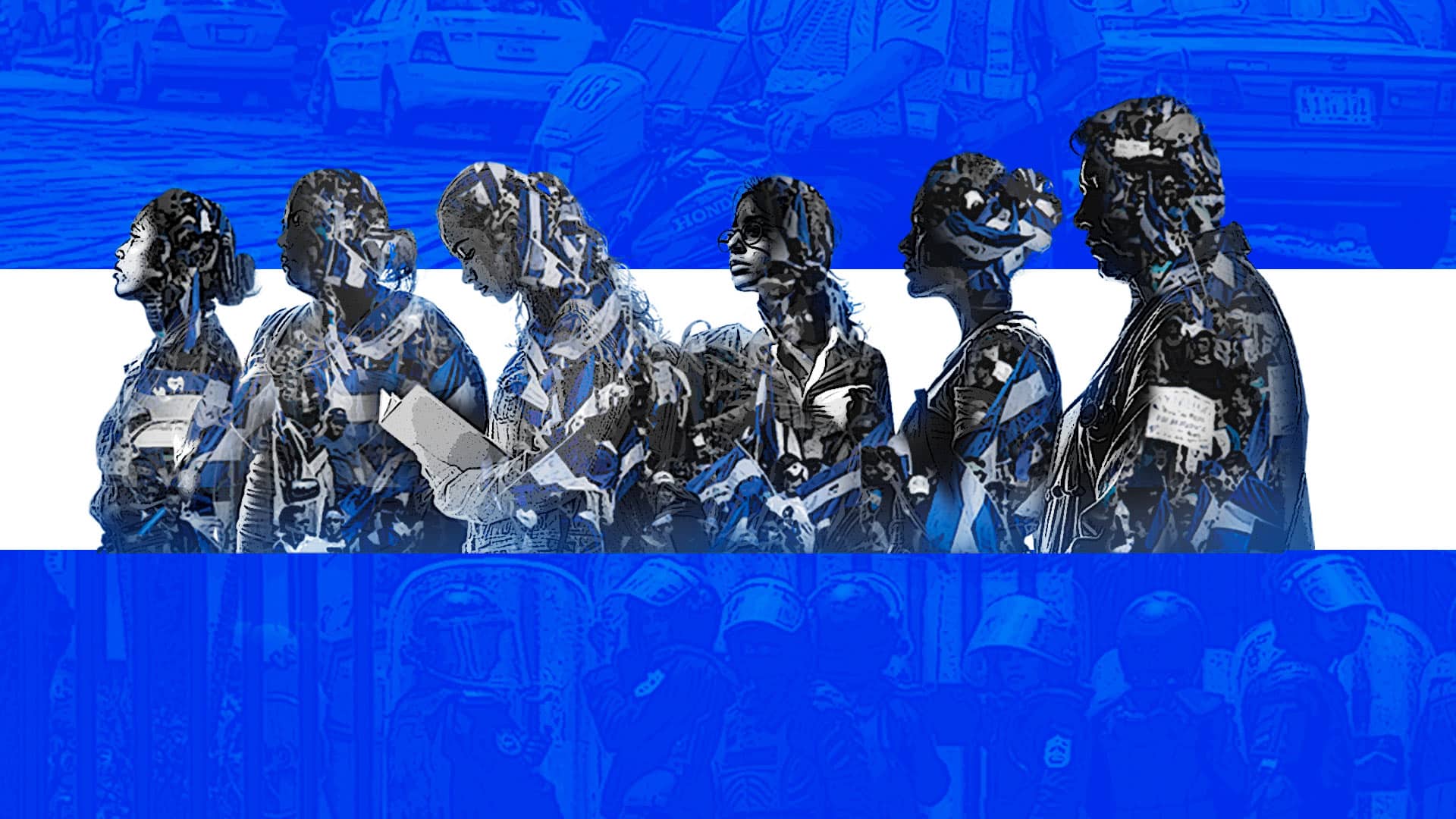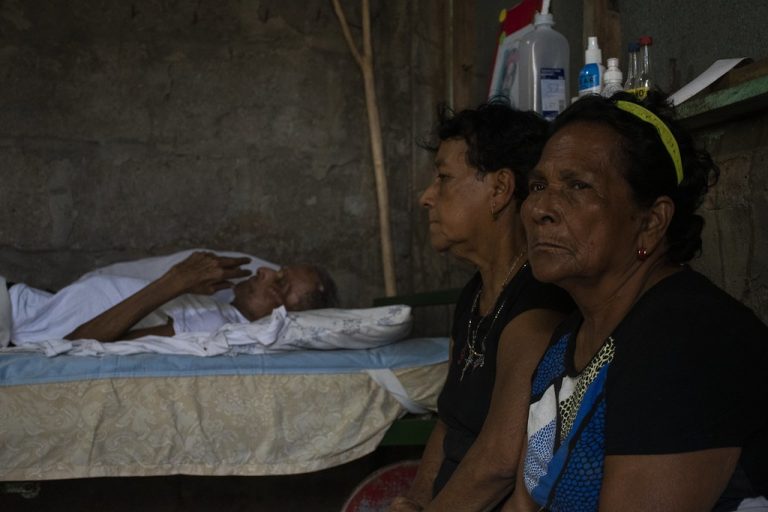18 de enero 2021

Six Years With April in Tow: Life Under Nicaragua's New 'Normal'

PUBLICIDAD 1M
PUBLICIDAD 4D
PUBLICIDAD 5D
Family members of former political prisoner from Ometepe, Justo Rodriguez, explain how he was attacked by police, and demand justice

Justo Rodríguez recovers at his home on the island of Ometepe. Photo: Claudia Tijerino | Confidential
A photograph, on the side of the bed in which he lies, is a reminder of what Justo Rodríguez López looked like less than nine months ago: strong, with a dark and radiant complexion and a disciplined mustache. In bed, he doesn’t look like himself: his skin is stuck to his bones, hairless, and unable to move anything but one of his arms and his deep eyes, through which he makes an effort to communicate.
Less than three weeks ago, political prisoner Justo Rodríguez managed to be transferred to his home on Ometepe Island, after being released from prison on December 21 by the Daniel Ortega regime.
Rodriguez was arrested in April 2020, for participating in a protest in commemoration of Ortega's massacre against the April 2018 Rebellion. He was returned to his relatives visibly deteriorated in health and quadriplegic, but today they celebrate that he shows slight signs of improvement.
Esmérita Rodríguez, Justo's sister, says that in spite of the multiple ills that afflict her brother, his “appearance has been recovering”, in the last few weeks. She recalls that in December, when she received him at the Antonio Lenín Fonseca Hospital in Managua, where he had remained for almost four out of the eight months that he had been incarcerated, Justo “was only bones”.
"I was given a little pile of bones," she laments.
Alilian López, also Justo’s sister, describes her brother’s small improvement as “something extraordinary”. She points out, with hope, that “he couldn’t move his hands, and now he’s stretching them”. You can hear the enthusiasm in her voice when she explains how Justo is able to pull a blanket over himself on his own, “because he was totally stiff”.
"I feel joyful about that," she emphasizes.
We recommend: Political Prisoners in Maximum Security Cells: Who are they?
Yonarqui Martinez, Justo's lawyer, believes that his slight recovery is due to "his will, the love of the family, the visits from friends, the help of many people who have allowed him to have access to medicine and adequate food.”
On the island, she details, there are no medical specialists, but “there are those who are in charge of him” and she hopes that at some point he can be transferred to be treated by an expert who can make a complete evaluation of his health condition.
Before being arrested on April 20, 2020, Justo made crafts from jícaro (Calabash tree) and grew yucca on a plot of land located a few meters from his house. He was on his way there when he was arrested by riot police who came to Ometepe Island to capture those responsible for a protest the night before.
“Where they grabbed him, they dragged him, they hit him, and then they lifted a spare tire that they had in the truck and dropped it on his chest," said Esmérita, to whom Justo explained what had happened when she managed to see him days later at the National Penitentiary System in Managua. Then, the man was complaining of pains in his chest, head, and back. It was the prelude of what was to come.
In the prison, Justo Rodríguez, 68, did not receive adequate medical attention, denounced his sister Esmérita. Instead, he was regularly taken to his hearings in the Managua courts, where on July 21, 2020, he was sentenced to three years in prison for the crime of obstruction of functions. A month later, he suffered a stroke and was transferred to the Lenín Fonseca Hospital.
In the hospital "they made some big wounds to take out clotted blood that was affecting his brain," explains Esmérita.
Then, she continued, “they made another cut to do a (surgical) drainage and then they made another cut to place a catheter”.
During that time, Justo "said that his buttocks were hurting, but we thought it was because he was sitting too long," until the doctors told a family member who was assisting him at the hospital that he would have to undergo another surgery.
Justo's family member was only told: "Your uncle is going to the operating room, sign here," says Esmérita. When the relative of the patient asked the reason for the surgery, the doctor replied, "It's urgent, we'll talk later," she adds.
"We don't know what that operation was for," the woman insists. It was “until now (after his release from prison), that they handed him over to us and told us how we were going to cure him, that we are seeing such iniquity. The wound from the last surgery "is like a fourth. From the rectum upwards," Esmerita details.
Without further explanation of his state of health, Justo was released from prison along with a thousand other common criminals who were freed by Daniel Ortega's regime on Christmas Eve.
Justo was transferred to Ometepe in critical condition. Even so, the police intercepted the family in the port of San Jorge, in Rivas: “They confiscated our things, they took everything away from us. Seeing that he was there, in the sun, they didn't let us pass until they checked everything we brought," remembers Alilian.
Since his release, the police patrol the perimeter of the family's house. Sometimes the officers stand on the corner of the house to watch who enters or leaves. But that has not prevented the solidarity of those who come to visit him. “Everyone who sees him ends up with tears in their eyes, and he just looks back at them,” laments Esmérita.
Alilian affirms that for the family, it "hurts a lot to see him the way they gave him to us". Despite the hope of his improvement, she assures that they are “resigned” to what may happen to his health.
This article has been translated by Ana María Sampson, a Communication Science student at the University of Amsterdam and member of our staff*
PUBLICIDAD 3M
Confidencial es un diario digital nicaragüense, de formato multimedia, fundado por Carlos F. Chamorro en junio de 1996.
PUBLICIDAD 3D